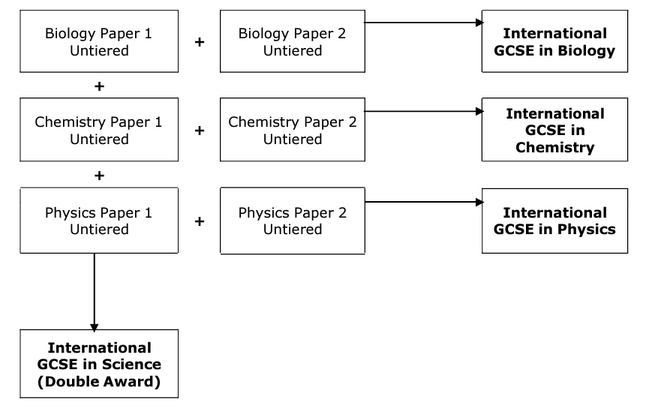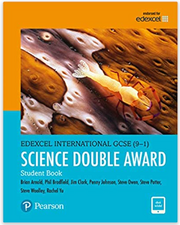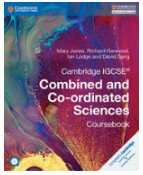Students wanting to sit combined science have a number of options.
Double science award means that all three sciences are studied, but the student will only be awarded 2 IGCSEs, both of which will be at the same grade.
Single science award means that all three sciences are studied, but the student will only be awarded 1 IGCSE.
IGCSE double and single science awards are available to private candidates from both Edexcel and Cambridge (CAIE) exam boards.
Double Award Options[]
Edexcel International GCSE Science (Double Award)[]
This is a popular choice among home educators, as it is often easier to find an exam centre in the UK for Edexcel exams.
Edexcel International GCSE Science (Double Award) page and specification
- Exams from: June 2019
- Available in June and November
- Specification code: 4SD0
Subject Content[]
| Biology | Chemistry | Physics |
|---|---|---|
| The nature and variety of living organisms | Principles of chemistry | Forces and motion |
| Structures and functions in living organisms | Inorganic chemistry | Electricity |
| Reproduction and inheritance | Physical chemistry | Waves |
| Ecology and the environment | Organic chemistry | Energy resources and energy transfers |
| Use of biological resources | Solids, liquids and gases | |
| Magnetism and electromagnetism | ||
| Radioactivity and particles | ||
| Astrophysics |
Assessment[]
The Edexcel Double Award is made up of the Paper 1s of the three individual sciences. The diagram below illustrates how the papers are combined. Familiarise students with the front of the paper as it can confuse them as it says both, Double Award and the individual subject.
100% exam based.
- Paper 1 B - 2hrs - 110 marks - 33.3%
- Biology content
- A mixture of different question styles, including multiple-choice questions, short-answer questions, calculations and extended open-response questions.
- Will include questions about practicals
- Can use a calculator
- Paper 1 C - 2hrs - 110 marks - 33.3%
- Chemistry content
- A mixture of different question styles, including multiple-choice questions, short-answer questions, calculations and extended open-response questions.
- Will include questions about practicals
- Can use a calculator
- Paper 1 P - 2hrs - 110 marks - 33.3%
- Physics content
- A mixture of different question styles, including multiple-choice questions, short-answer questions, calculations and extended open-response questions.
- Will include questions about practicals
- Can use a calculator
Resources[]
There is only one published textbook specifically for Double Award from Pearson. However some other of the books and revision guides for the individual sciences clearly mark which areas of content are only on paper 2. That means these resources could be used for Double Award - you just don't need to study the Paper 2 content. So do explore the Biology, Chemistry and Physics pages for more resources.
The Teaching and Learning materials on the specification page has topic guides, mapping documents, exemplars, past training and getting started guides which are really helpful.
Past papers can be accessed through the specification page or here. Papers with an R suffix were available in a different time zone. They are the same specification and can be used as practice. Papers will also have details of the individual science listed on the front - this is because the same paper is used for both qualifications - those sitting IGCSE Biology sit 1B and 2B, those sitting Double Award Science sit 1B, 1C and 1P.
Cambridge (CAIE) IGCSE Co-ordinated Science[]
Cambridge offer 2 IGCSEs in Co-ordinated Science from 2019. The difference is in the grading, 0973 being 9-1 and 0654 being A*-G, otherwise the syllabus is identical.
CAIE International GCSE Co-ordinated Science (0973) page and specification
CAIE International GCSE Co-ordinated Science (0654) page and specification
0973 was new in 2019. 0654 the specification was updated for 2019 exams.
- Exams from: 2019
- Available in Autumn and Summer series
- Specification code: 0973 (9-1) or 0654 (A*- G)
Subject content[]
| Biology | Chemistry | Physics |
|---|---|---|
| Characteristics of living organisms | The particulate nature of matter | Motion |
| Cells | Experimental techniques | Work, energy and power |
| Biological molecules | Atoms, elements and compounds | Thermal physics |
| Enzymes | Stoichiometry | Properties of waves, including light and sound |
| Plant nutrition | Electricity and chemistry | Electricity and magnetism |
| Animal nutrition | Energy changes in chemical reactions | Electric circuits |
| Transport | Chemical reactions | Electromagnetic effects |
| Gas exchange and respiration | Acids, bases and salts | Atomic physics |
| Coordination and response | The Periodic Table | |
| Reproduction | Metals | |
| Inheritance | Air and water | |
| Organisms and their environment | Sulfur | |
| Human influences on ecosystems | Carbonates | |
| Organic chemistry |
Assessment[]
The specification has three papers: a 1h 30min Alternative to Practical, a 45 min Multiple Choice and a 2 hr Theory paper.
CAIE science IGCSEs are tiered. This means that less able students can opt for the core tier, (papers 1, 3 and 6) but can only get a maximum grade of C or 5. More able students can opt for the higher (extended) tier (papers 2, 4 and 6) with the grade range of 9-1.
100% exam based.
- Paper 1 (core) or 2 (extended) - Multiple choice - 45 mins - 40 marks - 30%
- Forty compulsory multiple-choice questions
- Covers all content
- Paper 3 (core) or 4 (extended) - Theory - 2hrs - 120 marks - 50%
- Short-answer and structured questions
- Covers all content
- Paper 6 - (sat by both core and extended) - Alternatives to Practical - 1hr 30 mins - 60 marks - 20%
- Questions will be based on the experimental skills outlined in Section 4 of the specification.
Resources[]
There are several different textbooks, workbooks and revision books available for this specification - a list can be found here
Past papers can be found on the specification pages or sites such as pastpapers.co and papacambridge Each series of 0654 (besides the March series - which is only sat in India) has 3 sets of papers available. These are because they were sat in different time zones. They are the same syllabus and useful for practice. You can use both 0973 and 0654 papers to practice. 0654 papers prior to June 2019 are old specification, although the papers may still be useful for practice.
For individual science textbooks see the Biology, Chemistry and Physics pages for links to those books.
Single Award Options[]
Edexcel International GCSE Science (Single Award)[]
Edexcel International GCSE Science (Single Award) page and specification
- Exams from: June 2019
- Available in June and November (from 2023)
- Specification code: 4SS0
Subject Content[]
| Biology | Chemistry | Physics |
|---|---|---|
| The nature and variety of living organisms | Principles of chemistry | Forces and motion |
| Structures and functions in living organisms | Inorganic chemistry | Electricity |
| Reproduction and inheritance | Physical chemistry | Waves |
| Ecology and the environment | Organic chemistry | Energy resources and energy transfers |
| Use of biological resources | Solids, liquids and gases | |
| Magnetism and electromagnetism | ||
| Radioactivity and particles | ||
| Astrophysics |
Assessment[]
100% exam based.
- Paper 1 - 1hr 10mins - 60 marks - 33.3%
- Biology content
- A mixture of different question styles, including multiple-choice questions, short-answer questions, calculations and extended open-response questions.
- Will include questions about practicals
- Can use a calculator
- Paper 2 - 1hr 10mins - 60 marks - 33.3%
- Chemistry content
- A mixture of different question styles, including multiple-choice questions, short-answer questions, calculations and extended open-response questions.
- Will include questions about practicals
- Can use a calculator
- Paper 3 - 1hr 10mins - 60 marks - 33.3%
- Physics content
- A mixture of different question styles, including multiple-choice questions, short-answer questions, calculations and extended open-response questions.
- Will include questions about practicals
- Can use a calculator
Resources[]
There is only one published textbook specifically for Single Award from Pearson.
The Teaching and Learning materials on the specification page has topic guides, mapping documents, exemplars, past training and getting started guides which are really helpful. Particularly useful for helping decide on which route to follow is the mapping document that compares the content of the single, double and individual sciences.
Past papers can be accessed through the specification page or here. Papers with an R suffix were available in a different time zone. They are the same specification and can be used as practice.
For more resources see the individual science pages Biology, Chemistry and Physics for links.
Cambridge (CAIE) IGCSE Combined Science[]
CAIE International GCSE Combined Science (0653) page and specification
- Exams from: 2019
- Available in Autumn and Summer series
- Specification code: 0653 (A*- G)
Subject content[]
| Biology | Chemistry | Physics |
|---|---|---|
| Characteristics of living organisms | The particulate nature of matter | Motion |
| Cells | Experimental techniques | Work, energy and power |
| Biological molecules | Atoms, elements and compounds | Thermal physics |
| Enzymes | Stoichiometry | Properties of waves, including light and sound |
| Plant nutrition | Electricity and chemistry | Electrical quantities |
| Animal nutrition | Energy changes in chemical reactions | Electric circuits |
| Transport | Chemical reactions | |
| Gas exchange and respiration | Acids, bases and salts | |
| Coordination and response | The Periodic Table | |
| Reproduction | Metals | |
| Inheritance | Air and water | |
| Organisms and their environment | Sulfur | |
| Human influences on ecosystems | Carbonates | |
| Organic chemistry |
Assessment[]
The specification has three papers: a 1h Alternative to Practical, a 45 min Multiple Choice and a 1 hr 15 min Theory paper.
CAIE science IGCSEs are tiered. This means that less able students can opt for the core tier, (papers 1, 3 and 6) but can only get a maximum grade of C . More able students can opt for the higher (extended) tier (papers 2, 4 and 6) with the grade range of A*- G.
100% exam based.
- Paper 1 (core) or 2 (extended) - Multiple choice - 45 mins - 40 marks - 30%
- Forty compulsory multiple-choice questions
- Covers all content
- Paper 3 (core) or 4 (extended) - Theory - 1hr 15mins - 80 marks - 50%
- Short-answer and structured questions
- Covers all content
- Paper 6 - (sat by both core and extended) - Alternatives to Practical - 1hr - 40 marks - 20%
- Questions will be based on the experimental skills outlined in Section 4 of the specification.
Resources[]
There are several different textbooks, workbooks and revision books available for this specification - a list can be found here
Past papers can be found on the specification pages or sites such as pastpapers.co and papacambridge Each series of 0653 (besides the March series - which is only sat in India) has 3 sets of papers available. These are because they were sat in different time zones. They are the same syllabus and useful for practice. Papers prior to June 2019 are old specification, although the papers may still be useful for practice.
For individual science textbooks see the Biology, Chemistry and Physics pages for links to resources.
Cambridge (CAIE) IGCSE Physical Science[]
This is not a commonly sat exam and is available in the Autumn series only. Do check you have an exam centre that will accommodate before studying.
CAIE International GCSE Physical Science (0652) page and specification
- Exams from: 2019
- Available in Autumn series
- Specification code: 0652 (A*- G)
Subject content[]
| Chemistry | Physics |
|---|---|
| The particulate nature of matter | General physics |
| Experimental techniques | Thermal physics |
| Atoms, elements and compounds | Properties of waves, including light and sound |
| Stoichiometry | Electricity and magnetism |
| Electricity and chemistry | Atomic physics |
| Energy changes in chemical reactions | |
| Acids, bases and salts | |
| The Periodic Table | |
| Metals | |
| Air and water | |
| Carbonates | |
| Organic chemistry |
Assessment[]
The specification has three papers: a 1h Alternative to Practical, a 45 min Multiple Choice and a 1 hr 15 min Theory paper.
CAIE science IGCSEs are tiered. This means that less able students can opt for the core tier, (papers 1, 3 and 6) but can only get a maximum grade of C . More able students can opt for the higher (extended) tier (papers 2, 4 and 6) with the grade range of A*- G.
100% exam based.
- Paper 1 (core) or 2 (extended) - Multiple choice - 45 mins - 40 marks - 30%
- Forty compulsory multiple-choice questions
- Covers all content
- Paper 3 (core) or 4 (extended) - Theory - 1hr 15mins - 80 marks - 50%
- Short-answer and structured questions
- Covers all content
- Paper 6 - (sat by both core and extended) - Alternatives to Practical - 1hr - 40 marks - 20%
- Questions will be based on the experimental skills outlined in Section 4 of the specification.
Resources[]
There are several different textbooks, workbooks and revision books available for this specification - a list can be found here
Past papers can be found on the specification pages or sites such as pastpapers.co and papacambridge Each series of 0654 has 2 sets of papers available. These are because they were sat in different time zones. They are the same syllabus and useful for practice. Papers prior to November 2019 are old specification, although the papers may still be useful for practice.
Combined Science GCSEs[]
GCSEs in science are problematic for home educators as they require the exam centre to sign a form that all candidates have had the opportunity, provided by the centre, to complete the core practicals. Most centres - even commercial ones - will not do this for private candidates.
AQA Trilogy - 8464 (Double Award) is the most common spec sat in school. AQA also offers a single award Synergy - 8465. While both are theoretically open to private candidates, AQA state in their specifications "All GCSE science students need to complete practical experiments as part of their learning. A minimum of eight experiments are required for single science qualifications and 16 for double science qualifications. This equips students with essential practical knowledge and experiences, enables them to put theory into practice and helps them develop skills for higher education. Private candidates wishing to study GCSE sciences need to find a school or college who will let them carry out the required practicals. Schools and colleges accepting private candidates must make provision for them to carry out all of the required practical activities as specified in Practical assessment. This is likely to incur a cost. We recommend you contact your local schools and colleges to organise this as early as possible." Centres very rarely are able to provide GCSE to private candidates. If you do find one that says they will, do get an explanation in writing as to how they will meet the requirements for you to carry out the practicals, as centres who are not used to private candidates do sometimes say yes without realising the problems.
In 2021 and 2022 - adaptations were made to exams due to Covid. For GCSE Science, the requirement to carry out the experiments was replaced with having to observe (which could be digitally - so Youtube videos). This temporarily made them more accessible but from 2023 adaptations are removed and we will be back to normal. This means for the vast majority of home educators IGCSE is the route to go for sciences.






